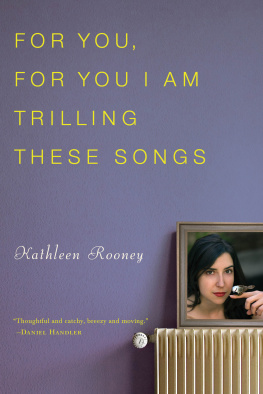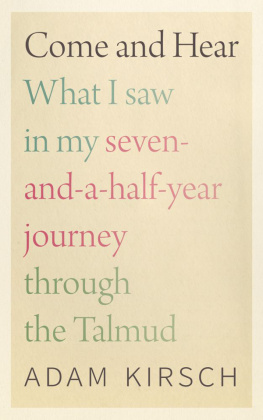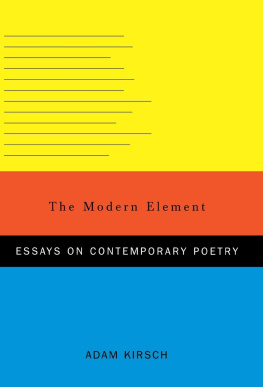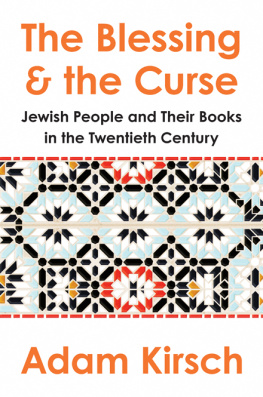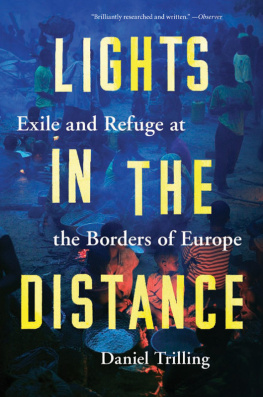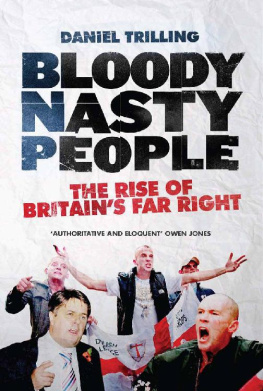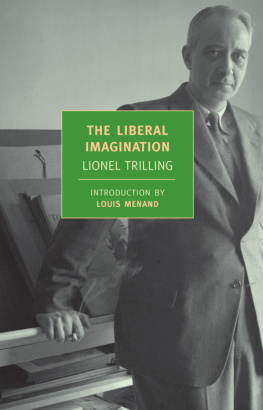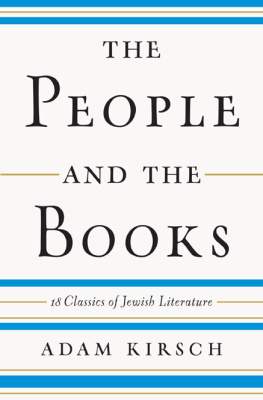why trilling matters
why
trilling
matters
adam
kirsch

Copyright 2011 by Adam Kirsch. All rights reserved. This book may not be reproduced, in whole or in part, including illustrations, in any form (beyond that copying permitted by Sections 107 and 108 of the U.S. Copyright Law and except by reviewers for the public press), without written permission from the publishers.
Why X Matters and the yX logo are registered trademarks of Yale University.
Yale University Press books may be purchased in quantity for educational, business, or promotional use. For information, please e-mail sales.press@yale.edu (U.S. office) or sales@yaleup.co.uk (U.K. office).
Set in Adobe Garamond type by Keystone Typesetting, Inc., Orwigsburg, Pennsylvania. Printed in the United States of America.
Library of Congress Cataloging-in-Publication Data
Kirsch, Adam, 1976
Why Trilling matters / Adam Kirsch.
p. cm. (Why X matters)
Includes bibliographical references and index.
ISBN 978-0-300-15269-2 (alk. paper)
1. Trilling, Lionel, 19051975Criticism and interpretation.
2. CriticismUnited StatesHistory20th century. I. Title.
PS3539. R56Z84 2011
818.5209dc22
2011014923
A catalogue record for this book is available from the British Library.
This paper meets the requirements of ANSI/NISO
Z39.48-1992 (Permanence of Paper).
10 9 8 7 6 5 4 3 2 1
books by adam kirsch
Benjamin Disraeli
The Modern Element: Essays on Contemporary Poetry Invasions: Poems
The Wounded Surgeon: Confession and Transformation in Six American Poets
The Thousand Wells: Poems
To Jonathan Rosen
contents
1
does literature matter?
We are all a little sour on the idea of the literary life these literature days. In America it has always been very difficult to believe that this life really exists at all or that it is worth living. To anyone who has been paying attention to the morale of American writers lately, such a diagnosis will come as no surprise. Hardly a year goes by without a novelist, poet, or critic coming forward to confess this sense of sourness, which is actually a compound of despair and resentment. Despair, because every department of literature seems to be undergoing simultaneous crisis, a multiple organ failure of the kind that inevitably leads to death; resentment, because of the contemporary American writers sense that he has been like the final investor in a Ponzi scheme, having bought into the venerable enterprise of literature only to discover that it is on the verge of default.
Poetry, of course, was the first to go. Already in 1991, in his essay Can Poetry Matter? Dana Gioia declared that American poetry belongs to a subculture. No longer part of the mainstream of artistic and intellectual life, it has become the specialized occupation of a relatively small and isolated group. As a poet, Gioia looked covetously at the attention and esteem given to fiction: A reader familiar with the novels of Joyce Carol Oates, John Updike, or John Barth may not even recognize the names of Gwendolyn Brooks, Gary Snyder, or W. D. Snodgrass. But five years later, Jonathan Franzen lamented in his essay Perchance to Dream that whatever attention the novel continued to receive was just consolation for no longer mattering to the culture. The poet might envy the novelist, but the novelist has his own jealousies: there are very few American milieus today in which having read the latest work of Joyce Carol Oates or Richard Ford is more valuable, as social currency, than having caught the latest John Travolta movie or knowing how to navigate the Web.
In the last few years, technological change and economic recession have combined to accelerate this long-term crisis. First local bookstores disappeared, victims of the chain stores and Amazon: since the 1990s, more than half of Americas independent bookstores have closed. The newspaper book review was next: in the 2000s, the Los Angeles Times, Washington Post, and many other major papers shrank or eliminated their book sections. Cynthia Ozick, in her 2007 essay Literary Entrails, performed the same kind of obsequies for literary criticism that Gioia and Franzen had done for poetry and fiction: What is missing is an undercurrent, or call it, rather (because so much rests on it), an infrastructure, of serious criticism.
University English departments are suffering: as long ago as 1999, in an essay titled The Decline and Fall of Literature, Andrew Delbanco observed that Literature is a field whose constituency and resources are shrinking. Even as it lost students to more pragmatic disciplines, English was also losing its intellectual identity: it has become routine to find notices in the department advertising lectures on such topics as the evolution of Batman alongside posters for a Shakespeare conference. Reading itself, according to a 2004 study by the National Endowment for the Arts, is in dramatic decline, with fewer than half of American adults now reading literature [and] the steepest rate of decline occurring in the youngest age groups.
For many readers and writers, all these anxieties find their ultimate focus in a fear that the book itself, the site and symbol of literature for the last five hundred years, is about to disappear, replaced by the Kindle or iPad or something equally suspect. Margaret Atwood expressed the fears of many readers over the age of, say, thirty when she wrote, This is crucial, the fact that a book is a thing, physically there, durable, indefinitely reusable, an object of value electrons are as evanescent as thoughts. History depends on the written word.
At such a moment, how could we not be a little sour on the idea of the literary life, or find it hard to believe that this life really exists at all? It may be surprising to learn that this complaint was made in 1952, just at the midcentury moment to which Franzen and Ozick look back so enviously. But the greater surprise is that it was Lionel Trilling who made it. For in the last twenty years, when writers have lamented the decay of literatures confidence and authority, they have often turned, as if by instinct, to Trilling as the emblem of those lost virtues. More than any twentieth-century American intellectual, Trilling stood for the principle that society and politics cannot be fully understood without the literary imagination. In his own career, he combined the traditional authority of the academiche was a professor of English at Columbia for four decadeswith the new authority of the freelance intellectualsome of his most important essays were written for little magazines like Partisan Review. His best-known book, the essay collection The Liberal Imagination (1950), continues to define an epoch in American intellectual history. When he died in 1975, at the age of seventy, the critic Steven Marcus paid tribute to his spiritual heroism on the front page of the New York Times.
It is so hard, today, to imagine this kind of honor being paid to a literary criticperhaps to any writerthat Trillings name is often invoked as a reproach to the fallen present. According to Delbanco, the cure for the decline and fall of literature is a return to Trillings ideal of literary education, as set forth in his essay The Uncertain Future of the Humanistic Educational Ideal: an exigent experience, in which an initiate became worthy of admission into the company of those who are thought to have transcended the mental darkness and inertia in which they were previously immersed. Ozick contrasts Franzens longing for a mass audience with Trillings recommendation, in The Function of the Little Magazine, that a writer direct his words to his spiritual ancestors, or to posterity, or even, if need be, to a coterie. This is what she describes as Trillings self-denying purity; purity for the sake of a higher purity.
Next page

